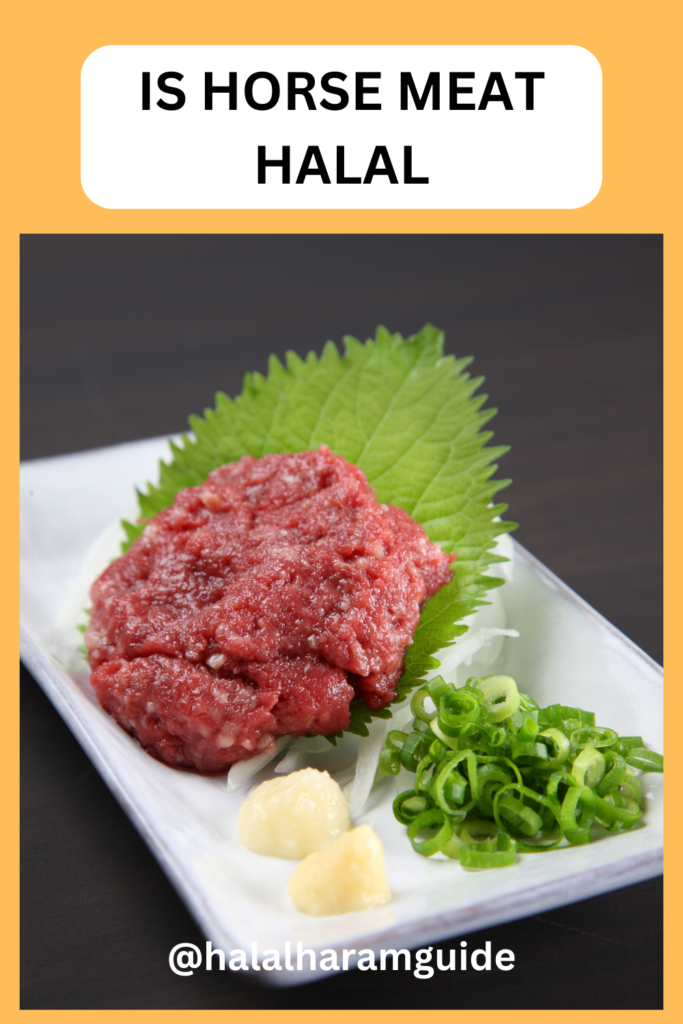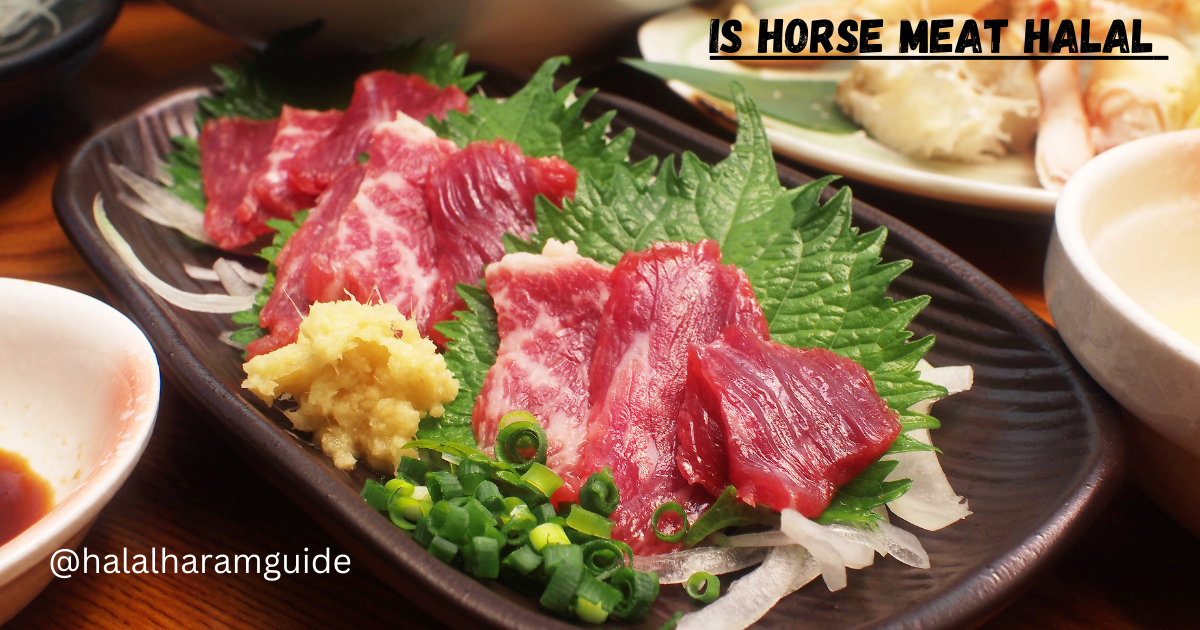In the realm of dietary choices, a question that occasionally arises is, “Is horse meat halal?”
This inquiry reflects the careful consideration many individuals give to their dietary practices, particularly when it comes to adhering to Islamic dietary laws. Horse meat, though consumed in various parts of the world, raises questions for Muslims who seek to ensure that their food aligns with halal principles. In this blog post, we delve into the topic of horse meat, exploring whether it is considered halal in Islamic dietary guidelines.
We aim to provide clarity and insights for those who wish to make informed choices about their food while staying faithful to their halal dietary preferences and beliefs.
Is Horse Meat Halal In Islamic World?
The permissibility of consuming horse meat in the Islamic world can vary depending on cultural and regional factors, as well as individual interpretations of Islamic dietary laws. There is no universal consensus on the issue of horse meat within the Islamic world. Here are some key points to consider:
Cultural Variations:
In some predominantly Muslim countries and regions, horse meat is consumed and considered halal. For example, it is consumed in some Central Asian countries like Kazakhstan and Kyrgyzstan. However, the acceptability of horse meat as a food source can vary significantly from one Islamic country to another.
Religious Opinions:
The permissibility of consuming horse meat is primarily a matter of interpretation. Some Islamic scholars and authorities may consider it halal as long as it meets the general criteria for halal meat, such as being slaughtered in accordance with Islamic ritual slaughter (zabiha) and not being from an animal that is explicitly prohibited in Islamic law.
Differing Views:
There is no clear consensus among Islamic scholars and schools of thought regarding the consumption of horse meat. While some scholars may consider it halal, others may have reservations or consider it makruh (disliked) due to differing interpretations of Islamic jurisprudence.
Local Practices: In regions where horse meat is consumed, it is often prepared and consumed in traditional dishes that have cultural significance. Local customs and practices can influence the acceptability of horse meat.
Given the variations in opinion and practice regarding horse meat in the Islamic world, individuals seeking guidance on this matter should consult with their local religious authorities or scholars who are knowledgeable about the specific dietary guidelines and practices in their region. It’s important to note that the acceptability of horse meat can differ from one Islamic community to another.
Can We Eat Horse Meat In Islam?
The permissibility of eating horse meat in Islam is a subject of differing opinions among Islamic scholars and schools of thought. There is no universal consensus on whether horse meat is halal (permissible) or not within the Islamic tradition.
The key consideration revolves around the method of slaughter. If a horse is slaughtered in accordance with Islamic ritual slaughter (zabiha or dhabiha), which involves invoking the name of Allah (God) and adhering to specific guidelines for humane and hygienic slaughter, some scholars argue that its meat can be considered halal for consumption.
However, opinions on this matter can vary among scholars, and it may also depend on local customs and practices. In some predominantly Muslim regions, horse meat is consumed and considered halal, while it may not be as commonly accepted in other Islamic communities.
Ultimately, individuals seeking guidance on whether horse meat is permissible in Islam should consult with their local religious authorities or scholars who are knowledgeable about the dietary guidelines and practices in their specific region or community.
All You Need To Know Before Eating Horse Meat.
Before consuming horse meat, there are several factors to consider, especially if you are in a region where it is not a common food source. Here are some important things to know before eating horse meat:
Legal Considerations: First and foremost, check the laws and regulations in your country or region regarding the sale, purchase, and consumption of horse meat. In some places, it may be restricted or prohibited.
Cultural Acceptance: Be aware of the cultural norms and acceptance of horse meat in your area. In some countries and regions, it is a traditional food source and widely accepted, while in others, it may be considered unusual or even taboo.
Halal or Haram: If you are a Muslim or adhering to Islamic dietary laws, consider the permissibility of horse meat in Islam. As previously mentioned, opinions on this matter can vary among Islamic scholars, so seek guidance from local religious authorities if needed.
Quality and Safety: Ensure that the horse meat you are considering is sourced from reputable suppliers and prepared under hygienic conditions. Verify that it has been slaughtered and processed according to food safety standards.
Ethical and Welfare Concerns: Some individuals may have ethical concerns about consuming horse meat due to the treatment of horses or their status as working animals. Consider these ethical factors and whether they align with your personal beliefs.
Allergies and Dietary Restrictions: Be aware of any allergies or dietary restrictions you may have. Some individuals may be allergic to specific proteins found in horse meat, so exercise caution if you have known allergies.
Cooking and Preparation: If you decide to cook horse meat, research appropriate recipes and cooking methods. As with any meat, proper cooking is essential to ensure safety and flavor.
Labeling and Transparency: If you are purchasing horse meat from a store or restaurant, ensure that it is labeled accurately and transparently. In some regions, there may be regulations regarding the labeling of horse meat products.
Taste and Texture: Keep in mind that horse meat may have a distinct taste and texture compared to other meats, such as beef or chicken. It is often described as lean and slightly sweet.
Personal Preferences: Ultimately, the decision to eat horse meat is a personal one. Consider your own preferences, beliefs, and comfort level with consuming this type of meat.
What Views Support Horse Meat As Halal?
The view that supports horse meat as halal (permissible) in Islam is primarily based on the method of slaughter and interpretations of Islamic dietary laws. Proponents of this view argue that if a horse is slaughtered in accordance with Islamic ritual slaughter (zabiha or dhabiha), it can be considered halal.
Islamic ritual slaughter involves invoking the name of Allah (God) before the animal is slaughtered and adhering to specific guidelines for humane and hygienic slaughter. According to this perspective, as long as the horse meat meets these criteria, it should be considered halal, similar to other permissible meats.
However, it’s important to note that opinions on this matter can vary among Islamic scholars and schools of thought, and some may have reservations about the consumption of horse meat based on their interpretations of Islamic jurisprudence.
As a result, individuals seeking to consume horse meat within the context of halal dietary guidelines should consult with their local religious authorities or scholars for specific guidance.
What Does the Quran Say About Eating Horse Meat?
The Quran does not specifically mention the permissibility or prohibition of eating horse meat. Islamic dietary laws, including what is considered halal (permissible) or haram (forbidden), are primarily derived from the Quranic principles and Hadith (the sayings and actions of the Prophet Muhammad), as well as interpretations by Islamic scholars.
The Quran provides general guidelines regarding permissible and forbidden foods, emphasizing the importance of consuming what is lawful and good. For example, in Surah Al-Baqarah (2:168), it states:
“O mankind, eat from whatever is on earth [that is] lawful and good and do not follow the footsteps of Satan. Indeed, he is to you a clear enemy.”
These verses encourage Muslims to consume foods that are halal and wholesome while avoiding what is haram or harmful. The specific categorization of individual animals and meats as halal or haram is often determined by Islamic jurisprudence (fiqh) and the interpretation of Hadith traditions.
As a result, whether horse meat is considered halal or haram in Islam is a matter of interpretation and can vary among scholars and schools of thought. It is not explicitly mentioned in the Quran, so opinions on this matter are derived from scholarly interpretations and consensus within the Islamic community.
What Hadith Explains Eating Horse Meat Is Sunnah?
There is no specific Hadith (sayings or actions of the Prophet Muhammad) that explicitly states that eating horse meat is Sunnah (a recommended practice) in Islam. The Hadith literature provides guidance on various aspects of daily life, including dietary choices, but there is no well-known Hadith that specifically encourages or recommends the consumption of horse meat.
Islamic dietary recommendations are generally based on the Hadith that provide guidance on the permissibility of certain animals and the proper method of slaughter (zabiha or dhabiha) for meat to be considered halal (permissible). Horses are not explicitly mentioned as a recommended source of meat in the Hadith literature.
It’s important to note that while the Hadith provides guidance on many aspects of life, not all specific dietary choices or preferences are mentioned in the Hadith. Muslims are encouraged to follow the general principles of halal and to consume what is lawful and good while avoiding what is haram or harmful, but specific dietary choices may vary based on cultural, regional, and personal preferences.
Conclusion
In conclusion, the permissibility of consuming horse meat in accordance with halal principles is a topic of debate among Islamic scholars and communities.
While some scholars argue that horse meat can be considered halal if certain conditions are met, others have reservations due to differences in the interpretation of Islamic dietary laws and the historical consumption practices of the Prophet Muhammad.
As a result, the acceptance of horse meat as halal varies among individuals and communities. Muslims seeking to include horse meat in their diet should consult with knowledgeable religious authorities or scholars for guidance specific to their circumstances and beliefs to ensure their dietary choices align with their understanding of halal principles.
Frequently Asked Questions
Q1. Is Elephant Meat Halal?
The consumption of elephant meat is not a common practice in Islamic dietary traditions, and there is limited guidance in Islamic jurisprudence regarding its permissibility. In general, to be considered halal, meat must come from animals that are permissible to eat in Islam, be slaughtered according to Islamic ritual slaughter (zabiha or dhabiha), and be free from any contaminants or imperfections. As elephants are not typically considered a permissible source of meat, their meat is not commonly consumed in Islamic communities, and specific rulings on its permissibility may vary among scholars.
Q2. Is Donkey Meat Halal?
The permissibility of consuming donkey meat is a matter of differing opinions among Islamic scholars and schools of thought. Some scholars permit the consumption of donkey meat if it is slaughtered in accordance with Islamic ritual slaughter practices and meets the general criteria for halal meat. However, others may consider it makruh (disliked) or haram (forbidden) based on their interpretations of Islamic jurisprudence. As with many uncommon or less conventional meats, the acceptability of donkey meat may vary among different Islamic communities and regions.
Q3. Is Horse Meat Halal In Sunni Islam?
The permissibility of consuming horse meat in Sunni Islam can vary based on interpretations and opinions of Islamic scholars. There is no consensus among Sunni scholars on whether horse meat is halal or haram. Some scholars and communities may consider it halal if the horse is slaughtered in accordance with Islamic ritual slaughter (zabiha) and meets other halal criteria. However, others may have reservations or consider it makruh (disliked) or haram based on their interpretations of Islamic jurisprudence. Therefore, whether horse meat is considered halal or not may depend on local customs, cultural practices, and individual scholarly opinions within Sunni Islam.
- “Is Lobster Halal? Understanding Its Permissibility”
- “Is Drawing Haram in Islam? Understanding the Perspective”
- “Is Fermented Kimchi Halal? Exploring Kimchi’s Halal Status”
- “Is Collagen Halal? Unveiling the Halal Status of Collagen”
- “Is Wine Vinegar Halal? Unveiling Its Permissibility”


